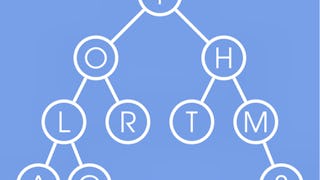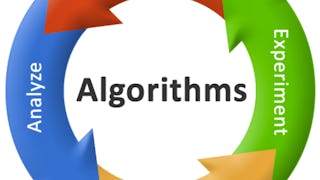- Browse
- Approximation Algorithm
Results for "approximation+algorithm"
 2
228DIGITAL
Skills you'll gain: Algorithms, Graph Theory, Computational Thinking, Applied Mathematics, Theoretical Computer Science, Operations Research, Linear Algebra
4.7·Rating, 4.7 out of 5 stars33 reviewsIntermediate · Course · 1 - 4 Weeks
 Status: Free TrialFree TrialD
Status: Free TrialFree TrialDDeepLearning.AI
Skills you'll gain: Descriptive Statistics, Bayesian Statistics, Statistical Hypothesis Testing, Probability & Statistics, Sampling (Statistics), Probability Distribution, Linear Algebra, Statistical Inference, A/B Testing, Statistical Analysis, Applied Mathematics, NumPy, Probability, Calculus, Dimensionality Reduction, Numerical Analysis, Machine Learning Algorithms, Data Preprocessing, Machine Learning, Machine Learning Methods
4.6·Rating, 4.6 out of 5 stars3.1K reviewsIntermediate · Specialization · 1 - 3 Months
 Status: Free TrialFree TrialU
Status: Free TrialFree TrialUUniversity of California San Diego
Skills you'll gain: Graph Theory, Logical Reasoning, Combinatorics, Computational Logic, Deductive Reasoning, Cryptography, Probability, Computational Thinking, Encryption, Probability Distribution, Network Analysis, Public Key Cryptography Standards (PKCS), Theoretical Computer Science, Bayesian Statistics, Python Programming, Data Structures, Cybersecurity, Algorithms, Arithmetic, Visualization (Computer Graphics)
4.5·Rating, 4.5 out of 5 stars3.7K reviewsBeginner · Specialization · 3 - 6 Months
 Status: Free TrialFree TrialU
Status: Free TrialFree TrialUUniversity of California San Diego
Skills you'll gain: Data Structures, Graph Theory, Algorithms, Program Development, Bioinformatics, Data Storage, Development Testing, Theoretical Computer Science, Computational Thinking, Network Analysis, Test Case, Programming Principles, Computer Programming, Python Programming, C and C++, Java, Rust (Programming Language), Javascript, Software Testing, Debugging
4.6·Rating, 4.6 out of 5 stars17K reviewsIntermediate · Specialization · 3 - 6 Months
 Status: Free TrialFree TrialS
Status: Free TrialFree TrialSStanford University
Skills you'll gain: Data Structures, Graph Theory, Algorithms, Bioinformatics, Theoretical Computer Science, Network Model, Programming Principles, Social Network Analysis, Network Analysis, Computational Thinking, Analysis, Computer Science, Network Routing, Probability, Pseudocode, Computational Logic, Operations Research
4.8·Rating, 4.8 out of 5 stars6K reviewsIntermediate · Specialization · 3 - 6 Months
 Status: NewNewStatus: Free TrialFree Trial
Status: NewNewStatus: Free TrialFree TrialSkills you'll gain: Data Structures, Algorithms, Computational Thinking, Programming Principles, Computer Programming, Computer Science
Advanced · Course · 1 - 3 Months
What brings you to Coursera today?
 Status: FreeFreeÉ
Status: FreeFreeÉÉcole normale supérieure
Skills you'll gain: Theoretical Computer Science, Combinatorics, Algorithms, Graph Theory, Computational Thinking, Mathematical Modeling, Probability
4.7·Rating, 4.7 out of 5 stars556 reviewsMixed · Course · 1 - 3 Months
 Status: Free TrialFree TrialU
Status: Free TrialFree TrialUUniversity of Colorado Boulder
Skills you'll gain: Theoretical Computer Science, Algorithms, Graph Theory, Data Structures, Operations Research, Public Key Cryptography Standards (PKCS), Cryptography, Programming Principles, Computational Thinking, Pseudocode, Design Strategies, Computer Science, Tree Maps, Encryption, Linear Algebra, Combinatorics, Mathematical Modeling, Advanced Mathematics, IBM Cloud, Python Programming
Build toward a degree
4.6·Rating, 4.6 out of 5 stars917 reviewsAdvanced · Specialization · 3 - 6 Months
 Status: Free TrialFree Trial
Status: Free TrialFree TrialSkills you'll gain: Data Structures, Graph Theory, Algorithms, Java, Java Programming, Theoretical Computer Science, Computer Programming, Computational Thinking, Programming Principles, Performance Tuning, Object-Relational Mapping, Computer Programming Tools
3.5·Rating, 3.5 out of 5 stars11 reviewsIntermediate · Specialization · 1 - 3 Months
 Status: Free TrialFree Trial
Status: Free TrialFree TrialSkills you'll gain: Computational Thinking, Algorithms, Graph Theory, Data Structures, C++ (Programming Language), C and C++, Programming Principles, Computer Programming, Object Oriented Programming (OOP), Technical Design, Theoretical Computer Science
4.6·Rating, 4.6 out of 5 stars16 reviewsIntermediate · Specialization · 1 - 3 Months
 Status: Free TrialFree TrialA
Status: Free TrialFree TrialAAlberta Machine Intelligence Institute
Skills you'll gain: Supervised Learning, Data Preprocessing, Feature Engineering, Responsible AI, Machine Learning Algorithms, Data Ethics, Applied Machine Learning, Model Evaluation, Data Quality, Classification Algorithms, MLOps (Machine Learning Operations), Model Deployment, Jupyter, Data Validation, Machine Learning, Decision Tree Learning, Business Operations, Data Cleansing, Product Lifecycle Management, Project Management
4.6·Rating, 4.6 out of 5 stars1.1K reviewsIntermediate · Specialization · 3 - 6 Months
 Status: NewNewStatus: Free TrialFree Trial
Status: NewNewStatus: Free TrialFree TrialSkills you'll gain: Proposal Writing, Performance Tuning, Agentic systems, Computational Thinking, Performance Analysis, Computational Logic
Intermediate · Course · 1 - 4 Weeks
In summary, here are 10 of our most popular approximation+algorithm courses
- Approximation Algorithms: 28DIGITAL
- Mathematics for Machine Learning and Data Science: DeepLearning.AI
- Introduction to Discrete Mathematics for Computer Science: University of California San Diego
- Data Structures and Algorithms: University of California San Diego
- Algorithms: Stanford University
- Advanced Algorithms and Problem-Solving Techniques: Packt
- Approximation Algorithms Part I: École normale supérieure
- Foundations of Data Structures and Algorithms: University of Colorado Boulder
- Java: Data Structures and Algorithms: Codio
- C++: Data Structures and Algorithms: Codio










